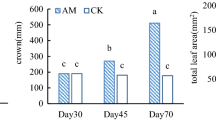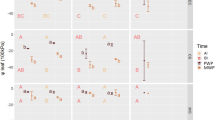Abstract
IN plant physiology potometry is still frequently considered a suitable method for measuring plant transpiration provided that the plant organs are cut under certain precautions, namely, under very clean distilled water, previously boiled, in order that the formation of gas bubbles in the vessels be avoided. Of course, the transfer of the cut stems or leaf-stalks to the potometer must be done without bringing the cut surface into contact with the air.
This is a preview of subscription content, access via your institution
Access options
Subscribe to this journal
Receive 51 print issues and online access
$199.00 per year
only $3.90 per issue
Buy this article
- Purchase on Springer Link
- Instant access to full article PDF
Prices may be subject to local taxes which are calculated during checkout
Similar content being viewed by others
References
Loftfield, J. V. G., "The Behavior of Stomata", Carnegie Inst. of Washington Pub. (1921).
Bode, H. R., Jahrb. wise. Bot., 62, 92 (1923).
Dixon, H. H., "Transpiration and the Ascent of Sap in Plants" (London, 1914).
Author information
Authors and Affiliations
Rights and permissions
About this article
Cite this article
RAWITSCHER, F., RAWITSCHER, E. Inadequacy of Potometry for Measuring Plant Transpiration. Nature 163, 68–69 (1949). https://doi.org/10.1038/163068a0
Issue Date:
DOI: https://doi.org/10.1038/163068a0
This article is cited by
-
Summary method for determining the water consumption for the transpiration of woody plant seedlings
Biologia Plantarum (1967)
Comments
By submitting a comment you agree to abide by our Terms and Community Guidelines. If you find something abusive or that does not comply with our terms or guidelines please flag it as inappropriate.



